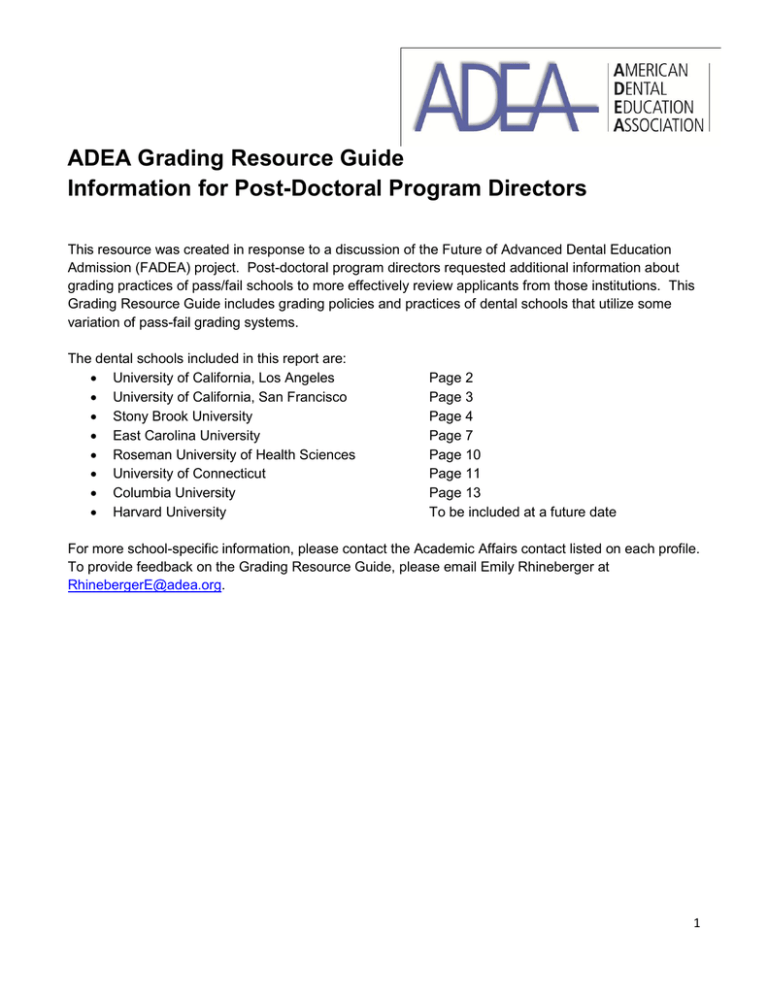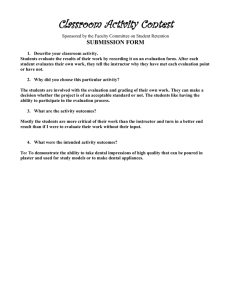ADEA Grading Resource Guide Information for Post
advertisement

ADEA Grading Resource Guide Information for Post-Doctoral Program Directors This resource was created in response to a discussion of the Future of Advanced Dental Education Admission (FADEA) project. Post-doctoral program directors requested additional information about grading practices of pass/fail schools to more effectively review applicants from those institutions. This Grading Resource Guide includes grading policies and practices of dental schools that utilize some variation of pass-fail grading systems. The dental schools included in this report are: University of California, Los Angeles University of California, San Francisco Stony Brook University East Carolina University Roseman University of Health Sciences University of Connecticut Columbia University Harvard University Page 2 Page 3 Page 4 Page 7 Page 10 Page 11 Page 13 To be included at a future date For more school-specific information, please contact the Academic Affairs contact listed on each profile. To provide feedback on the Grading Resource Guide, please email Emily Rhineberger at RhinebergerE@adea.org. 1 School Name: University of California, Los Angeles Stated Grading Policy: Pass/ No Pass Academic Affairs Contact: Carol A. Bibb, PhD, DDS Associate Dean for Student Affairs cbibb@dentistry.ucla.edu Is GPA Calculated? Yes No Is Ranking Available? Yes No Limited Percentage Competency is measured at: The level of performance needed for a passing grade in the course and competency is determined by each course chair. Policy on Remediation of a Course: No Pass grades can only be remediated to a No Pass/Marginal grade. Beginning with the Class of 2014, the Marginal grade has been eliminated so No Pass grades can only be remediated to a No Pass/Pass. Narrative Statements on Scoring Internal scoring policies: Exceptional Performance Reports (EPRs) are used to describe strengths and weaknesses. Excellent EPRs are used at the discretion of the course chairs to recognize students in the top 5 to 10% of the performance criteria. Beginning with the Class of 2014, EPRs will be termed Performance Reports (PRs). EPRs/PRs are for internal use only. Official scoring policies: Beginning with the Class of 2014 course chairs have the option of giving the grade of Honors (H) for the top performers in the course. The H appears on the transcript. Graduation policies: Clearance for graduation requires a passing grade (P, NP/M, M) in all didactic and clinical courses and a pass on Parts 1 and 2 of the National Board Dental Examination. Additional Information The Marginal grade has been eliminated and the Honors grade instituted effective for the Class of 2014. Therefore, the passing grades will be H, P, NP/P. 2 School Name: University of California, San Francisco Stated Grading Policy: Pass/ No Pass Academic Affairs Contact: Dorothy A. Perry, PhD, Associate Dean for Education and Student Affairs PerryD@dentistry.UCSF.edu Is GPA Calculated? Yes No Is Ranking Available? Yes No Limited Percentage Competency is measured at: Minimum of 70% and can be higher if determined by the course director. Policy on Remediation of a Course: A student having an NP or F (in the case of some elective courses and postgraduate courses) student must petition the Office of the Registrar for removal of the grade during the quarter following successful completion of the course requirements. The NP or F grade will remain on the transcript and the student will not be permitted to graduate until the course is successfully remediated. A student may repeat only those courses in which a grade of NP, D, or F was given. A student can repeat a course only once. If a student is required to repeat one full academic year, that can only be done once limiting the duration of the DDS curriculum to a maximum of 5 academic years. Narrative Statements on Scoring Internal scoring policies: 70% was adopted by the faculty as passing in order to eliminate the “D” grade. All students are required to perform at “C” level or higher. Course directors are responsible for determining criteria to be met for passing grades, and for honors and commendations (see below). The UCSF School of Dentistry Competency Statements are integrated into the curriculum, and each course director is responsible for identifying, introducing or developing, and measuring competencies pertinent to their particular course. Official scoring policies: GPA’s and rankings are not computed for the dental and international dental students, final grades are reported as P/NP in the first two years of the curriculum, and as H/P/NP in the third and fourth years. H grades (Honors) may be awarded in the 3rd and 4th year dental and international dental courses by criteria set by the course directors. Honors grades are not set according to a “curve” or a percentage of the students taking the course. Although honors grades are not awarded in the first and second year of the curriculum, course directors provide letters of commendation for outstanding performance in their courses. Commendations are earned based on criteria set by the course directors, as for Honors grades. Graduation policies: Students are graduated by the faculty when all courses have been successfully completed including clinics, rotations, and didactic activities. Additional Information Academic distinctions such as commendations, honors, and competitively awarded scholarships are highlighted in the dean’s letter. Abbreviations used: P (Pass), H (Pass with Honors): A (Excellent), B (Good), C (Fair), D (Poor) [letter grades are used in certain elective courses, and postgraduate professional and graduate courses]; NP (not passed), F (Failure). 3 School Name: Stony Brook University Stated Grading Policy: Pass/Fail Academic Affairs Contact: David W. Paquette, Associate Dean for Education David.Paquette@stonybrookmedicine.edu Is GPA Calculated? Yes No Is Ranking Available? Yes No Limited If limited: please explain: Didactic and technique courses are graded as A (Superior), B (Good), C (Satisfactory) or F (Failure). Patient care courses and seminars are graded H (Honors), S (Satisfactory) or U (Unsatisfactory). Further, GPA or rank is determined only to identify award recipients and is not posted on the transcript. Percentage Competency is measured at: Competency is measured using formative and summative assessments that occur across the four-year curriculum. Student mastery of the knowledge, skills and values for entering general dental practice are assessed according to eight institutional competencies [i.e., 1) effective communication; 2) professionalism, ethics and personal values; 3) scientific knowledge and problem-solving; 4) assessment and diagnosis; 5) dental therapeutics and oral rehabilitation; 6) social and community contexts of healthcare; 7) practice management and informatics; and 8) selfassessment and lifelong learning] and 32 institutional learning objectives. Complete competency (100%) must be documented by graduation. Policy on Remediation of a Course: Students receiving an “F” or “U” grade in a course will be offered a make-up examination as part of the remediation for the course. Alternatively, the course director may determine that a student is “not remediable, except through repeating a course.” This determination of “not remediable, except through repeating a course” must be made in consultation with the Associate Dean for Education. All make-up examinations offered to resolve an “F” or “U” initial course grade must be completed and graded by July 31st of that academic year (unless the course end-date is after July 31st, in which case the deadline will be extended until two weeks after completion of the course). Students who pass the course make-up examination will receive a grade of “C” or “S” on their permanent transcript regardless of the performance on the reexamination. If the student fails the course make-up examination, the failing course grade (“F” or “U”) will be registered on the student’s permanent transcript for the respective academic year. The Academic Standing Committee will review the record of any such student and will consider a recommendation for repeating the failed course versus placement of the student on a “modified program of study.” If the student receives a passing grade after repeating the course, the grade of “A,” “B,” “C,” “H,” or “S” will appear on the student’s transcript for the subsequent academic year. Make-up examinations will not be offered for any course that is being repeated because of a previous failure. Furthermore, the Academic Standing Committee will consider dismissal for any student who fails both the initial and repeated course. 4 Narrative Statements on Scoring Internal scoring policies: It is the policy of the School of Dental Medicine to not calculate grade point averages (GPAs) or rank predoctoral dental students in a given class, except to determine nominees for academic achievement awards. A weighted grade point average is calculated for internal purposes only, which includes identifying three graduating students who qualify for Latin honors (summa cum laude, magna cum laude and cum laude) at graduation. Official scoring policies: Didactic and technique courses o A - Superior, Excellent. Exceptional achievement; student performing at highest level of knowledge or skill expected at his/her level of development. o B - Good. Student performing above average level of knowledge or skill expected at his/her level of development. o C - Average. Student performing at level expected at his/her stage of development; performance may deviate somewhat both above and below the norm of performance, but not sufficiently to warrant the next higher or lower grade. o F - Failure. Level of performance is unacceptable; Patient care courses (clinics) and seminars o H - Honors. Corresponds to A level of performance. o S - Satisfactory. Covers B and C levels of performance. o U - Unsatisfactory. Corresponds to F grade. I - Incomplete. Used when a student does not complete the required course work by the stated end of a course due to circumstances beyond their control (i.e. illness, death in the family, other documented personal problems, etc.). (NOTE: not to be used for patient care courses.) R - Requirements incomplete. Used only for patient care courses when students do not complete the minimal clinical accomplishments by the end of the academic year. W - Withdrawal. Used if a student is given permission to withdraw from a course in progress prior to taking the final examination or completing the equivalent course requirements, with the expectation of taking it over again in the future. This grade will also be used for any uncompleted courses in the event that a student withdraws from the School of Dental Medicine prior to the completion of these courses. Graduation policies: The Doctor of Dental Surgery (DDS) degree will be conferred by Stony Brook University upon those persons who fulfill the following comprehensive requirements: Filed satisfactory evidence of having met the requirements for admission; Attended at a minimum of four separate years of dental instruction, the last two years of which must have been enrolled in the Stony Brook University School of Dental Medicine; Satisfactorily completed all course work, examinations, mandatory academic exercises, minimal clinical accomplishments and competency exams; Successfully passed Part I and Part II of the National Board Dental Examination; Maintained acceptable academic ethics and professional behavior, as delineated by the School of Dental Medicine Honor Code, Academic Policies and Procedures, as well as, but not limited 5 to the ADA Principles of Ethics and Code of Professional Conduct, applicable state and federal laws, and generally accepted standards of professional behavior; Paid all tuition, fees and fines in full; Completed the American Dental Education Association (ADEA) Senior Survey and exit surveys conducted by the Office of Education. All requirements for the DDS degree must be met within six years total from the time of initial matriculation. This time limitation does not apply to students in a combined degree program (e.g., DDSPhD) or other approved programs. Items accompanying transcript (A= all the time, R= must be requested) The three graduates with the highest overall academic averages will be awarded Latin honors (summa cum laude, magna cum laude and cum laude respectively), which will appear on the diploma and permanent transcript (A). Those graduates who distinguish themselves in the area of research during their DDS training will receive formal recognition with the conferring of the “DDS with Distinction in Research.” This distinction will appear on the diploma and permanent transcript (A). The criteria for this distinction include (but are not limited to): participation in the School of Dental Medicine Summer Research Fellowship Program or other documentable research experience while in dental school; presentation at the school’s annual Student Research Day; and authorship on an abstract accepted to a state, national or international research meeting, or authorship on a paper consisting of research conducted while in dental school. Special consideration and priority will be given to students who have participated in national meetings, completed research fellowships or received other research awards. Additional Information: The School of Dental Medicine is integrated within a collaborative university Health Sciences Center. Predoctoral dental students are enrolled in biomedical sciences courses at the School of Medicine with medical students for the first year and a half. Preclinical operative instruction begins in the fall semester of year one, and clinical patient care begins in the summer ending year one. The small class size (approximately 40) makes for intimate and personalized student-learning experiences. 6 School Name: East Carolina University Stated Grading Policy: Pass/Fail Academic Affairs Contact: Todd Watkins DDS Assistant Dean for Dental Education and Informatics WATKINSR@ecu.edu Is GPA Calculated? Yes No Is Ranking Available? Yes No Multiple In traditional educational models with GPAs and course grades, the class rankings were used for honors designations. In the last 20 years, dental education has found that the relative structure of the outcomes do not help with these traditional measures of academic success. The students are supposed to be evaluated to competency, not grades. ECU truly evaluates each competency as required by the CODA standard. The irony is that it provides multiple opportunities for precise rankings. While some schools could use this for an honors calculation, ECU chooses to use it to inform curriculum changes and identify areas of targeted supplemental instruction. Simply put, every student is strong and weak in specific areas. Few, if any, student is perfect in all aspects of didactic, problem-solving, and clinical skills. Therefore, a blended ranking is not helpful for the purpose of predicting future pan-professional success. ECU uses this data to assist specific curriculum needs for specific students, not for value judgments of cohort performance. Percentage Competency is measured at: 75% of Cohort Performance Policy on Remediation of a Course: ECU provides specifically designed “supplemental instruction” based on areas of difficulty as specified in the Grid, or as indicated by a specific exam or skillsassessment. Narrative Statements on Scoring Internal scoring policies: There are four (4) quantitative measures for student performance on three different types of cognitive outcomes – didactic, clinical, and discussion. ECU normalizes the results from exams, pre-clinical, clinical, PBL and CBL testing environments in order to map against a set of 26 competency metrics. These metrics are maintained on an outcomes “Grid”. The data from the testing environments is added daily and the analysis is automatically recalculated within the grid. The students are re-ranked constantly relative to others in the cohort for (1) didactic performance relative to the competencies, (2) clinical performance relative to the competencies, (3) discussion performance relative to the competencies, and (4) combined performance relative to the competencies. There are two types of didactic exams – basic didactic instruments (multiple choice and true/false) and staged didactic instruments (OSCE and essay). The didactic environment provides roughly 8,000 points towards competence. There are two types of clinical outcomes – pre-clinical experiences from simulation activities and clinical experiences from patient care. All clinical experiences are pre-assigned Relative Educational Value Units and student performance minimal levels are marked in the grid. The clinical outcomes provide roughly 20,000 points towards competence. There are two distinctive discussion environments – PBL where students discuss a myriad of problems and question in small groups and CBL where case-based scenarios are discussed with a final report. The discussion environment is managed with a micro-blog technology (currently Yammer) and every post and final report is graded using a custom grading tool. The discussion outcomes provide roughly 8,000 points towards competence. 7 There are three (3) qualitative measures for student performance. There are roughly 40 pre-clinical “skills assessments” where the quality of work is evaluated on an A, B, C, F scale. There are roughly 25 clinical “skills assessments” where the quality of work is evaluated on an A, B, C, F scale. There are daily professionalism grades given for evaluation of student interactions with patients in clinic. Therefore ECU evaluates student competence using 4 quantitative and 3 qualitative measures. Final class rankings can include subsets of performance within individual competency areas on the grid. A detailed narrative of student strengths and weaknesses can be delivered to graduate programs. Didactic Environment policies: The students take weekly didactic exams. There are over 150 exams. The students must maintain a minimum cumulative score of 70% on all didactic instruments. Failure of individual exams requires a retake at the end of the term. Subsequent retake failure requires supplemental instruction by the faculty member most related to the failed content. OSCE failure depends on the instrument. Clinical Environment policies: The students must pass all graded exercises and skills assessments in pre-clinic and clinical environments. There is a minimum number of ReVUs required for each competence area as maintained in the Grid. Discussion Environment policies: The students must participate in all PBL and CBL discussions. The performance in monitored by the discussion grading tool and the Grid. Each student must develop a case write-up of assigned patients in the discussion environment. These are graded as part of discussion, not clinic. Graduation policies: Students must pass Part 1 and Part 2 National Boards. Additional Information We believe we will have extraordinary details on the performance of each student relative to the cohort of the class that is superior to GPAS. We will be able to tell a program how they performed on the macro-level as well as to the detail of a specific discipline as well as specific strengths and weaknesses. 8 9 School Name: Roseman University of Health Sciences Stated Grading Policy: Pass/ No Pass Academic Affairs Contact: Dr. Victor A. Sandoval, Associate Dean for Academic Affairs vsandoval@roseman.edu Is GPA Calculated? No Yes Is Ranking Available? Yes No Limited Percentage Competency is measured at: 90% Policy on Remediation of a Block: Every two weeks, students are given an individual and team competency assignment. Students who have not achieved the passing standard of a 90% score (inclusive of any percentage points added from the team exam), must return on the following Monday for additional remediation and reassessment. Students are then individually reassessed using a different assessment instrument. Following the remediation assessment, there is no team assessment. Should a student not achieve the passing standard of 90% following the remediation assessment, they are given an additional opportunity to remediate the content during the summer. Student progression through that academic year is not delayed. Summer remediation is held during a designated six-week period immediately prior to the start of the next academic year. Students who do not demonstrate competency on more than five (5) assessments or remediation assessments during the regular academic year are required to withdraw from the program. Narrative Statements on Scoring Graduation policies: 1. Follow the approved course of study leading to the completion of all DMD block requirements; 2. Satisfactorily complete all academic blocks and competencies within six (6) years, having earned no grade below “Pass”; 3. Pass Part I and Part II of the National Board Dental Examination; 4. Receive a favorable recommendation for conferral of the DMD degree from CODM faculty and Dean, University Administrative Council, and University Board of Trustees. Additional Information The academic calendar utilizes a “Block System” of curriculum time; During the assessment, if the team scores a 95% or higher on the team exam, each team member receives 5 percentage points added to his/her/ individual assessment score. 10 School Name: University of Connecticut Stated Grading Policy: Pass/ Fail Academic Affairs Contact: Dr. Steven M. Lepowksy, Senior Associate Dean for Education & Patient Care Lepowsky@nso2.uchc.edu Is GPA Calculated? Yes No Is Ranking Available? Yes No Limited Percentage Competency is measured at: Varies throughout the curriculum. Generally is at 80% or greater, but never less than 1.5 SD from mean performance. Policy on Remediation of a Course: Institutional academic policy provides all students with an opportunity for remediation. Remediation is offered if a student did not demonstrate satisfactory attainment of course objectives, but the deficiency is minor and can be remediated through a process less extensive than repeating a course. If a student fails substantially short of demonstrative attainment of course objectives, a grade of Unsatisfactory (U) will be given and the course must be retaken; if a course is retaken, both the failure and the pass will appear on the student’s transcript. Narrative Statements on Scoring Internal scoring policies: The academic performance of dental students in a course is assessed by the course director or teaching committee, who will assign a grade of Satisfactory (S) or Unsatisfactory (U) for each student. Course grades are determined on the basis of all information pertaining to that course, including non-examination performance (e.g. clinical activities, laboratory experiences, small group discussion, narrative reports) as well as numerical grades on examinations, if offered. A global assessment of academic performance throughout the curriculum, including clinical performance, as well as community service, all contribute to the Institutional Evaluation, and will be reflected in the overall evaluation of the applicant. The Institutional Evaluation is composed by a committee with representation by faculty and clinical staff with familiarity with the students throughout the year curriculum. Official scoring policies: Grades appear as Satisfactory (S) or Unsatisfactory (U). Graduation policies: IN order to graduate from the School of Dental Medicine, a student must attain or demonstrate the following: Satisfactory grades in all School of Dental Medicine courses; in no case can a student graduate with an unsatisfactory or incomplete grade in any course in the curriculum Competency as demonstrated by satisfactory completion of all competency evaluations Successful completion of all clinical activities defined as experiential requirements Continued demonstration of professionalism and behavioral characteristics consistent with that of a practitioner of dental medicine Participation in community services 11 Successful Complete of Part I and Part II of NBDE Items accompanying transcript: None; note that reverse side of transcript contains information regarding the grading policies. 12 School Name: Columbia University Stated Grading Policy: Honors/ Pass/ Fail Academic Affairs Contact: Dr. L. Moss-Salentijn, Vice Dean, Academic Affairs 212-305-8334 Is GPA Calculated? Yes No Is Ranking Available? Yes No Limited If limited, please describe: At the end of Year III, ranked by thirds. Also, at Commencement, top 8 for Omicron Kappa Upsilon and #1. Percentage Competency is measured at: Determined by course instructor. Policy on Remediation of a Course: Must be approved by Class Academic Monitoring Committee. Limit of two remediations, if more must repeat year. Maximum one year repeated. Narrative Statements on Scoring Internal scoring policies: At the end of Year III, the Academic Dean and Senior Associate Dean Student & Alumni Affairs review total class performance with hour weighted (H, P, F) grades to divide the class into thirds as reported in the Institution Evaluation. Official scoring policies: One-third “Highest Recommendation”; one-third “Highly Recommended”. And one-third “Recommended”- also exist “Recommended with Reservation and “Not Recommended.” Graduation policies: All competencies and courses must be passed for usual mid-May degree. A June 30th degree is also possible. Additional Information About 25% of a class typically achieves “Honors” in each course, depending on the course director’s decision as to the level of performance required for an “H.” Description of curriculum, e.g. what portion shared with College of Physicians and Surgeons Letter of good ethical and academic standing With H, P, F and the class division into thirds, we rarely have an issue with it being very clear where a student stands with respect to preparation for advanced education. 13



